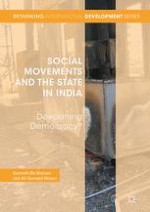2016 | OriginalPaper | Buchkapitel
2. The Slow-Motion Counterrevolution: Developmental Contradictions and the Emergence of Neoliberalism
verfasst von : Radhika Desai
Erschienen in: Social Movements and the State in India
Verlag: Palgrave Macmillan UK
Aktivieren Sie unsere intelligente Suche, um passende Fachinhalte oder Patente zu finden.
Wählen Sie Textabschnitte aus um mit Künstlicher Intelligenz passenden Patente zu finden. powered by
Markieren Sie Textabschnitte, um KI-gestützt weitere passende Inhalte zu finden. powered by
